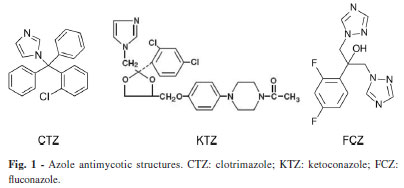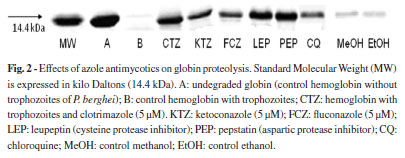Plasmodium parasites degrade host hemoglobin to obtain free amino acids, essential for protein synthesis. During this event, free toxic heme moieties crystallize spontaneously to produce a non-toxic pigment called hemozoin or ß-hematin. In this context, a group of azole antimycotics, clotrimazole (CTZ), ketoconazole (KTZ) and fluconazole (FCZ), were investigated for their abilities to inhibit ß-hematin synthesis (IßHS) and hemoglobin proteolysis (IHbP) in vitro. The ß-hematin synthesis was recorded by spectrophotometry at 405 nm and the hemoglobin proteolysis was determined by SDS-PAGE 12.5%, followed by densitometric analysis. Compounds were also assayed in vivo in a malaria murine model. CTZ and KTZ exhibited the maximal effects inhibiting both biochemical events, showing inhibition of β-hematin synthesis (IC50 values of 12.4 ± 0.9 µM and 14.4 ± 1.4 µM respectively) and inhibition of hemoglobin proteolysis (80.1 ± 2.0% and 55.3 ± 3.6%, respectively). There is a broad correlation to the in vivo results, especially CTZ, which reduced the parasitemia (%P) of infected-mice at 4th day post-infection significantly compared to non-treated controls (12.4 ± 3.0% compared to 26.6 ± 3.7%, p = 0.014) and prolonged the survival days post-infection. The results indicated that the inhibition of the hemoglobin metabolism by the azole antimycotics could be responsible for their antimalarial effect.
ß-hematin synthesis; Azole antimycotics; Hemoglobin degradation; Plasmodium berghei






